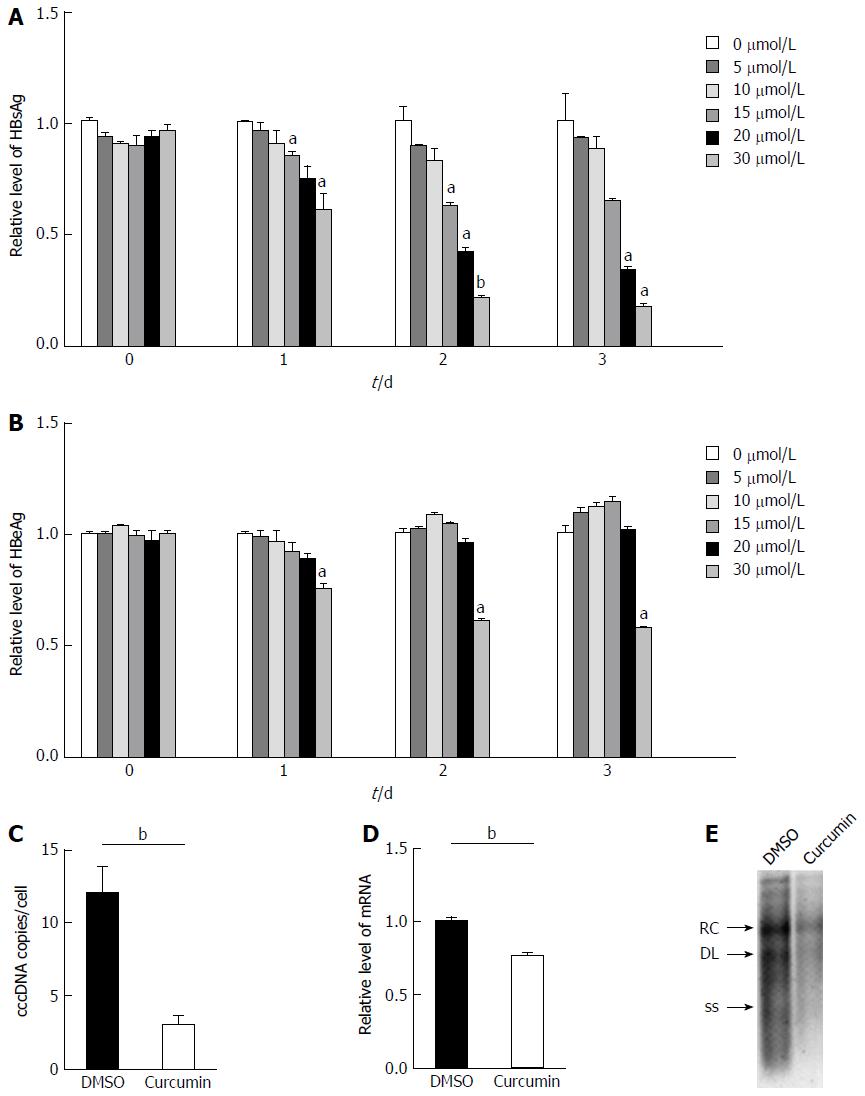Copyright
©The Author(s) 2017.
World J Gastroenterol. Sep 14, 2017; 23(34): 6252-6260
Published online Sep 14, 2017. doi: 10.3748/wjg.v23.i34.6252
Published online Sep 14, 2017. doi: 10.3748/wjg.v23.i34.6252
Figure 2 Curcumin inhibits hepatitis B virus replication and expression.
A: HepG2.215 cells were treated with 0, 5, 10, 15, 20 or 30 μmol/L curcumin for three consecutive days. Culture medium from each day was collected and analysed for levels of HBsAg; B: Culture medium from each day was collected and analysed for levels of HBeAg; C: Hepatitis B virus (HBV) cccDNA accumulation in HepG2.215 cells treated with 20 μmol/L curcumin or DMSO for 2 d. HBV cccDNA was digested with Plasmid-Safe ATP-Dependent DNase to degrade contaminating HBV that had inserted in cellular genomic DNA and OC species and was then subjected to PCR amplification to amplify HBV cccDNA forms. Results are expressed as numbers of cccDNA copies per cell; D: Total RNA was extracted from HepG2.215 cells treated with 20 μmol/L curcumin or DMSO for 2 d and was subjected to real-time PCR to quantify HBV mRNA transcript levels; E: HBV DNA was extracted from intracellular core particles in HepG2.215 cells treated with 20 μmol/L curcumin or DMSO for 2 d. Southern blot analysis of HBV DNA replicative intermediates. RC, DL and SS represent relaxed circular, double linear and single-stranded forms of HBV DNA, respectively. All experiments were repeated at least three times; ELISA and RT-PCR were performed in duplicate. aP < 0.05; bP < 0.01. cccDNA: Covalently closed circular DNA; DMSO: Dimethyl sulphoxide.
- Citation: Wei ZQ, Zhang YH, Ke CZ, Chen HX, Ren P, He YL, Hu P, Ma DQ, Luo J, Meng ZJ. Curcumin inhibits hepatitis B virus infection by down-regulating cccDNA-bound histone acetylation. World J Gastroenterol 2017; 23(34): 6252-6260
- URL: https://www.wjgnet.com/1007-9327/full/v23/i34/6252.htm
- DOI: https://dx.doi.org/10.3748/wjg.v23.i34.6252









